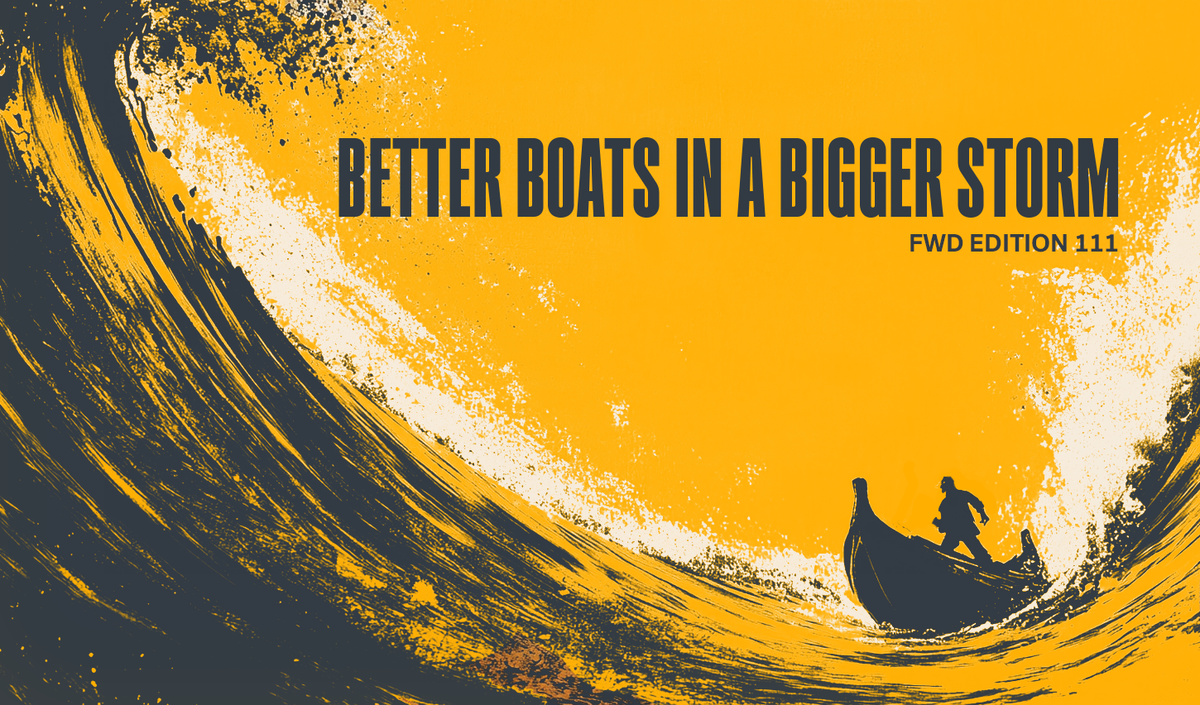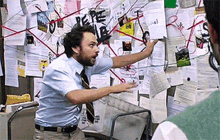Better boats in a bigger storm -OR- what 2024 taught us about trust
The fantasy that you could just podcast-SEO-blog-social media your way to a community of happy customers has ended. But the storm is just beginning.

FWD Edition 111: Part 2/2 of What We Gained and Lost in 2024
The value proposition of this newsletter is to take the larger trends in culture, economics, and human behavior and apply them to the growth challenges of ventures that depend on trust. A lot of weeks that gives me the heeby-jeebies. The mountain to climb is steep.
I do this because much of the tactical advice you all are getting is throwing you onto a hampster wheel of activity and marketing spend that is very difficult to get off, affirms some of the worst instincts of founders, and ignores nearly a decade of evolution around us. The status quo in growth and marketing thinking is boring, anachronistic, more financially beneficial for your vendors than you.
My business would be so much easier if I could just convince myself to write some pithy "you need a better brand" email and let ChatGPT scrape it and hope I make the linked citations at the end.
But I'm not that guy. I'm the red string guy. I'm the theory of everything guy. And most importantly, I think I'm the guy that can take these big ideas and invite you into a real opportunity to capitalize on, rather than fight the winds of change.

But that means every week we've got to go on a bit of a journey together. This is my final summary of the 2024 big journey, and its a doozy. Hope you'll join me.
Let's ride.
Trust Fall
2024 confirmed two hard truths:
- We are structurally post-trust: Our capacity to trust is at all-time lows across nearly all institutions, ideas, and perspectives.
- We are incentivized to trust less: The information ecosystem (platforms, recommendation algorithms, digital media) that serves nearly every American their reality is a trust-destroying machine.
How we know we're post-trust (as if basic observational skills couldn't do it):
- 90% of executives (people reading this newsletter) think their customers trust their companies. Only 30% do, a 60-pt trust gap, increasing year-over-year. (PWC)
- Public trust in government has been at historic lows for the last 12 years, with no meaningful difference between presidents or political parties. (Gallup)
- Americans' trust in media is at a record low. (Gallup)
- The number of Americans who have zero to little trust in higher education has more than TRIPLED since 2015 to 32%. (The Hill)
Do we actually believe that all our cultural players and institutions have declined at a record pace? Do we really think that this is a total shit show and everything is terrible and only getting worse? Do we really believe that 1985 or 1955 or 1925 was better?
I think it's rare for a person to believe that.
And yet, every single one of us is infected by this trust decay. And there are actors of all ideological persuasions doing what power-aggregators of every generation have done: look for weakness and exploit it. So they pile on to the "everything is terrible but me" story, feeding a vague narrative of distrust without actual knowledge. We don't know things are untrustworthy; we're just being given a vibe that they are. Red dye #40 is bad for you, so therefore, the entire food industry is trying to kill you, etc.
Stood up alone, those narratives are great straw men, easy to beat the hay out of, but in the collective, they surround nearly every piece of knowledge we seek to deliver or consume.

The Illusion of the Signal/Noise Ratio
As the information ecosystem has worsened, people have figured out how to monetize disinformation, and AI rules the day; we've hand-waived dramatically how to find the whispering signal in the noise. We framed this "access to everything" problem as a sorting challenge--we just need to separate the wheat from the chaff, thus the rise of recommendation algorithms everywhere. But this sorting is failing dramatically. We don't know who or what to believe, and there is no consistent sound or sight of the supposed "signals" of trust.
I was on the signal-in-the-noise train for a long time. But this year, through much learning, reading, studying, and surveying, I've realized the metaphor fails. We're not sorting signals from noise. We're in an utterly uncharted sea storm without stars or compass, tantalized by the promise of salvific ships that disappear just as fast as they came:
- We are in the middle of a decades-long disruption in how information and knowledge are distributed across human society.
- Each iteration of that disruption lasts about 12-18 months and includes cultural and newsworthy landmarks and short-term inefficiencies that can be capitalized on to gain attention, usually through new platforms.
- The platforms are willing to let you use them for attention-getting because it feeds them with clout and content that they own, which they will eventually monetize with your implicit consent.
- Platform inefficiencies have 3-to-5-year tails where well-resourced players (read: businesses that spend a lot of money) can continue to win the attention arbitrage game to ever-diminishing returns.
- The mass middle (80% of ventures and institutions) will adopt these inefficiencies after the bulk of the opportunity has been sapped. Unless they bring jarringly unique value, they'll add to the noise and the platforms' ability to monetize it.
- You will recognize the late stage of an inefficiency by the volume of vendors who are selling their expertise.
How to slowly go insane
The best example of this is SEO. Because Google had a years-long monopoly on search, it defined what you can know on the internet for almost twenty years. Initially, this created massive market inefficiency that was begging to be exploited. Experts in SEO-driven content marketing made ungodly money by doing exclusively SEO at the beginning of this curve, helping their clients hit the top of page one.
Then, slowly, the mass market joined in. Some are slower than others, extending the long tail. Knowledge industries like wealth, consulting, and education were surprisingly slow to SEO, given how well-built they are to capitalize on it, so many in those industries still think of this as "new."
By the mid-2010s, SEO was seen as a required expense for every marketing endeavor, powered by a robust, Google-funded SEO industrial complex. Not ironically, by this point, two other things are going on:
- Google knows that it's going to supplant its search business with AI. But it needs content creators and SEOs to keep making content, so it continues to feed the "here's our latest update to win at SEO" manipulation.
- The SEO inefficiency is all but gone, but thousands of businesses believe the delusion that traffic=conversions=leads=sales. Which by then, it definitely didn't.
Today, the primary driver of SEO activity is SEO vendors who are scrambling to convince you that getting scraped by Gemini AI is critical for your business, and they can help you.
Because none of us have ever done this before (This = living through a complete media and information infrastructure upheaval powered by a worldwide ungated many-to-many interface that we don't have the societal or mental frameworks to know how to interpret or manage), we all little by little by little slip into the "What the Actual F*ck" fugue state.
Which is where most of us are now:
- Cognitively exhausted.
- Cynical about all information platforms.
- Committed to circling the wagons and limiting our media input while still checking everywhere for FOMO.
- Happy to build echo chambers to lower the volume on waves hands wildly all of this.
- Desperately searching for a controlling narrative that sees us as powerful and worthy but with limited places to find it.
That's how we get to last week's Edition: You can have any internet you want, just not that one and how we get to a Trump presidency if you're just catching up.
What is the internet we can't have?
The one where you get the information you want, from people you trust, in a format that's meaningful to you, supported by algorithms that have your best interests in mind. The Fantasy Internet.
For ventures trying to grow (or not shrink, I see you Higher Ed) the Fantasy Internet also includes the ability to communicate across platforms, be seen by your target customers, engage those customers with content and value, and have that value be consumed and trigger action toward a buying decision.
That's how it was supposed to work. Except it doesn't. And it won't because the internet's largest and most powerful builders are not incentivized in any way to build that for you. In the glory days of content marketing, c. 2010, Google and Facebook were the closest to having that incentive. Then, after the 2016 election, they realized that noise was more profitable than content and less risky. And so they let the whole system get overrun by noise, knowing they would "solve" it with AI.
Of course, the AI-solve buries your value-added content under layers of summaries, bots, and agents. Killing organic traffic for both your social media posts and your website. This has been well-documented in 2024. Accelerating traffic to people who excel in selling distrust. Distrust is sexy. It's populist. It's fast moving. It doesn't need fact-checkers or proof or even a coherent religion. It just needs volume and conviction, two things the internet loves to consume.
What happens now
In short, no one knows. This disruption of how we get information and knowledge is in the early-to-mid stages. Higher Ed is being rewritten, not with vision, but with cynicism powered by distrust. Media is in an unpredictable and extended downward spiral. These two behemoths, among others, are societal features we trusted in the past to help us sort out knowledge and information. They are being dismantled. We are being overrun by more new information than the human brain has ever seen.
We're removing the levees while we feed the hurricane. I'm not saying this won't end well. I'm saying that we're in it for the long haul.
So for you, you who want to carve out a modicum of trust for your business, for your team, for your idea, for your career, you cannot solve all of this. You, arguably don't even need to keep on the pulse of it (I do that for you). But you do have to be aware of the storm we are in.
If you think we're in the 2015 storm, you'll ride an SEO boat to nowhere.
If you think we're in a 2019 storm, you'll Instagram and podcast yourself in a circle.
We've all been trained to jump from one platform inefficiency boat to the other, but (and here's the most important thing I'll say) most of us are not risk hungry enough to get in the boats early enough. Almost everyone jumps on these ships late, long after they've stopped working well. And most of us are so afraid of "missing the boat" we're still doing the last thing we did and the thing before that.
(There's an AI generated image here somewhere of a guy in a suit with legs in seven diffrent boats going seven different directions tearing him apart, but I'll save the gallon of water it requires to generate that image well and just let you imagine.)
So we're still blogging, doing YouTube, making podcasts, doing SEO, sending cold emails, joining Facebook groups, posting on LinkedIn, and getting employees to be "thought leaders," and, and, and...ad nauseum... ad mortem.
The three big lessons for growth from 2024:
Given all of the above—and these lessons would not make sense or be implemented correctly if you didn't understand all of the above—I've got three big 2024 lessons for you.
"You" are leaders of ventures who wish to earn trust and have that trust make growth. If you wish to do something else, more power to you, you should probably read a different newsletter.
- Slow content: This movement has been brewing for a while, and we're gonna see it start to take practical shape in 2025. You need to have fewer things to say, of greater depth, driven by knowledge that only you could have, based on your unique value drivers. As the famous media maven Tina Brown says, "If you don't have the budget, you must have a point-of-view." You've got to put the work into every piece of content. If your competitors could have produced the same thing, you can probably skip it.
- Relational distribution: We've known the platforms were zero-click for a while. The big players, LinkedIn, Meta, TikTok, X, and YouTube, will block or deprecate content with outbound links. So wherever you put content you've got to put the value on platform. If your customers have to click out, good luck. Add to it, that the internet is now a honeycomb of self-created echo chambers, and you cannot effectively broadcast anymore. You've got to be in communities, in Reddit threads, in members-only groups, where your clients are, and distribute one-to-a-few instead of many-to-many. Many-t0-many is the realm of AI and noise.
- Radically focused positioning: Almost every firm I've worked with starts with what they like about themselves, who they like to work with, puts those in a Venn diagram and thinks that's positioning. It's not. Positioning (a pre-requisite for growth) requires three things:
- A right-sized total addressable market: Big enough that you can grow into it, small enough that you can be a leader reaching it. Almost everybody is targeting too big a pool. The internet did that to you.
- A service with distinguishable value: Your CX, your customer care, your values, your internal culture are not a defined service. Most trust-hungry businesses have not productized enough for people to understand what the hell they're actually selling and why it matters to a specific group.
- A recognizable outcome unique to your service: People who hire you, use your service, and do what you say should have a repeatable outcome that you can point to again and again and again. I don't care how "custom" you think you are.
It's important to say that none of this is "marketing." Increasingly, marketing, particularly the digital variety, is what we do when we don't want to think hard about strategy. Again, the internet did this to you. Two decades of supposed inefficiencies that you could tap and grab attention/traffic from have led you to the religion that everything is tactics and hacks.
Here's the bottom line truth: moving forward, almost nothing of distinguishable value for your growth is in the tactics. Tactics is how you get extracted, used, and caught up in the hurricane. You need 60-70% fewer tactics in play. You need dramatically less dependency on outside platforms and SAAS.
You're going to have to build your own boat.
That is what CultureCraft does. We know the storm better than anybody. We bias all our work and research to $3-2oM ventures (profit and non) that are powered by knowledge and want to win with trust. And we pull them from the noise factory to win on their own terms.
We make hurricane-ready boats.
Let's go.
P.S. - I'm incredibly indebted to the timely and thorough vlog from the Green brothers, they are--as always--a lighthouse in the wild.
